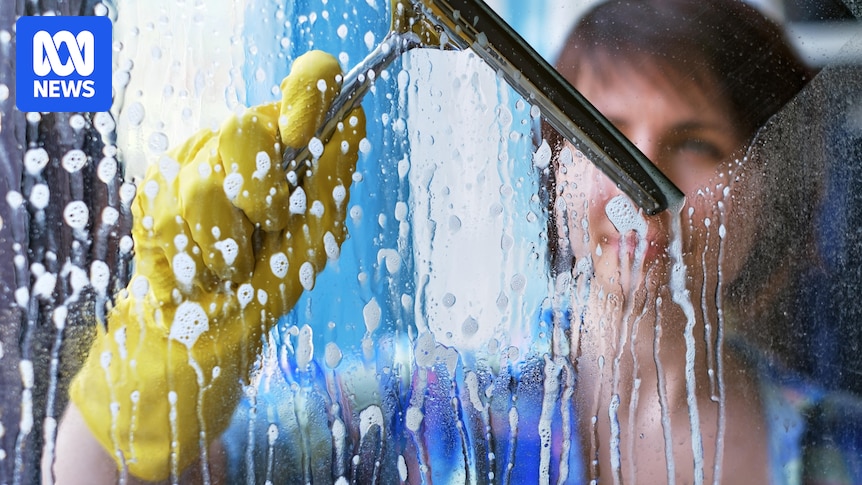There are few things that make a home look as instantly inviting as crystal-clear windows, but cleaning them is a task that often lingers down the bottom of the to-do list.
Cleaning your windows doesn’t have to be an arduous task, and there’s no need to shell out for expensive cleaning products to get the job done well.
We asked two experts to share their tips on the most effective ways to clean windows and leave them with a streak-free finish.
What should you use to clean your windows?
Emma Morris is a specialist bond cleaner based on the Gold Coast/Yugambeh country, and says when it comes to cleaning windows, the most important tools in her arsenal are a squeegee and a bucket.
“Not just a cheap, plastic squeegee — you want to invest in something that’s going to last long term, with the soft sponge on one side, and also a rubber back to squeegee the water and residue off the windows,” she says.
It’s a sentiment shared by Nick Palomo, a professional residential and commercial window cleaner based in Brisbane/Meanjin.
“Before I started cleaning windows myself, I never thought about using squeegees; I just think people don’t know that’s what you’re supposed to be using,” Mr Palomo says.
Other than a squeegee, Ms Morris says “a simple, clean microfibre cloth and some water is usually my go-to for cleaning windows”.
“Go over the window with the soft side of the squeegee, squeegee it off with the rubber side, and the microfibre cloth just takes off any of those water marks that might be left, so there are no water droplets left and there’s a streak-free shine,” she says.
Microfibre sleeves are also a handy tool for cleaning grime from dirty windows.
Mr Palomo says he also uses microfibre sleeves, which are placed over a T-shaped handle.
What cleaning products should you use on windows?
Ms Morris says there’s no need to invest in expensive brand-name cleaning sprays. A little dishwashing liquid — and some good old-fashioned elbow grease — is enough to do the job effectively.
“I don’t have a particular brand [of dishwashing liquid] I use, it’s usually whatever’s on special,” she says, adding that store-bought sprays can be more of a hindrance than a help.
“When I’m going into properties and cleaning windows, there’s often quite a lot of residue from products that are unsuitable for using on windows, and they’re not cleaned off properly.”
Mr Palomo says he also primarily uses a splash of “regular dishwashing liquid”.
What about newspaper and paper towels?
Applying store-bought cleaning spray to the glass and wiping it off with scrunched-up newspaper or paper towels has traditionally been many people’s go-to for cleaning windows, but Ms Morris says she steers clear of using either.
“I find using excess paper towels, apart from it being bad for the environment and for your pocket, there is no need for it.
“Paper towels also leave a residue, and when you have a residue on windows, dust and grime tend to stick to it.”
She acknowledges scrunched-up newspaper can be helpful to “get off the grit and the grime”, but says some of the inks used in today’s papers have a tendency to “transfer onto your hands, which transfers onto your windows”.
What technique should you use?
One of the most effective squeegee methods to avoid streaks, Mr Palomo says, is what’s referred to as “the S technique”, which involves going over the window with the sponge side of the squeegee and then going from the top left-hand corner down in a motion that resembles that letter “S”.
“The trick is to try to not try to lift the squeegee, and just always have it in contact with the glass,” he says.
But, he adds, “even if you don’t really know what you’re doing” with a squeegee, and you “do straight pull-downs” by dragging from squeegee from the top of the window to the bottom, “that will still be better than just using paper towels and your regular spray cleaner”.
Beware of very hot or cold water
In summer, particularly if you’re living somewhere particularly hot and humid, Ms Morris cautions against using water that’s too cold, and likewise, in winter, she says you should avoid using water that’s too hot.
“Windows are susceptible to cracking under pressure from water that’s too hot or too cold, especially windows where you might get that odd stone chip from mowing the lawns,” she says.
“Lukewarm water would generally be the best to use on a window; that way, you’ll avoid any cracking or putting the window under too much stress.”
What else should you keep in mind?
Although white vinegar is often touted as an effective home-cleaning product, Ms Morris doesn’t recommend using it on windows.
“Vinegar attracts flies, which is not what you want for your windows,” she says.
“Also, if you’re near a beach, or on a main road where you get excess exhaust fumes on the windows and they can become quite dirty, I would recommend using just a splash of dishwashing liquid in a bucket. Wash down the window first, then hose that off and go over it again with the squeegee.”
To prevent the squeegee getting mouldy, Ms Morris recommends rinsing the rubber side after every use and putting the sponge side in the washing machine when you’re doing a load of other cleaning cloths and rags.
And Mr Palomo recommends trying to make sure you wash your windows “regularly, at least every couple of months”.
“It’s much easier to just do a regular quick clean than waiting like two years when it’s dirty and caked on,” he says.
